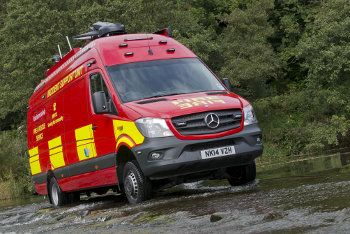
Northumberland Fire & Rescue’s latest 4×4 Sprinter has been configured as an Incident Support Unit, with full IT and communications facilities.
Northumberland is home to some of the UK’s most rural and rugged scenery, prompting the county’s Fire & Rescue Service to acquire a new Incident Support Unit, based on a 5.0-tonne Sprinter 519 CDI, which arrived via North-East Dealer Bell Truck and Van.
The long-bodied, V6-engined van was converted for command and control operations by West Midlands specialist Macneillie (see here, here and here for some more of this company’s specialist conversions), and is fitted with cutting-edge communications technology that can be used by up to five personnel.
Chief Fire Officer Alex Bennett said:
“This custom-built vehicle will allow us to deliver our services in a more co-ordinated and professional manner and mean we are better able to protect our communities across the county at a time of increased risk from floods and other natural events.
The Incident Support Unit represents a significant financial investment but given that we expect to run it for at least 10 years, I have no doubt that it will prove to be money very well spent.
Past experience has given us complete confidence in the Mercedes-Benz 4×4 chassis, which means we can operate anywhere across a county that includes some very challenging terrain.”
Northumberland Fire & Rescue Service also operates four other all-wheel drive Mercedes-Benz vans – three are assigned to its Swift Water Rescue teams and carry inflatable boats, while the fourth is a Specialist Rescue Unit and equipped with heavy-duty cutting gear, including shears and saws, as well as stabilisation tools.
Prior to entering service the new vehicle was presented at this year’s Ambition show at Olympia – where it was seen by Home Secretary Theresa May – and at the Emergency Fleet Exhibition in Telford.
Factory 4×4
The Sprinter 4×4 is a genuine, factory-built option, rather than an aftermarket conversion, and rides higher than its standard counterpart. It employs rear-wheel drive for road use, but all-wheel drive can be selected when venturing off road.
Conventional 4×4 vehicles rely on mechanically operated differential locks to prevent spinning wheels and guarantee equal speed on all four wheels. The Sprinter 4×4, by contrast, uses a development of the Mercedes-Benz 4-ETS (Electronic Traction System), which is integrated with the Adaptive ESP® anti-skid technology to provide unrivalled traction management.
ICT equipment supplied by Excelerate Technology for installation in the air-conditioned Northumberland vehicle includes a roof-mounted, foldable satellite dish and a camera mounted on a retractable six-metre mast. Macneillie also fitted M1-compliant swivelling seats, a 10kVA generator which is accessed via the rear doors and housed behind a sound-proofed bulkhead, and stabiliser legs to ensure continuity of satellite signal during operations. An awning and external hatch through which a 40in screen can be viewed, means the area beside the vehicle can be used for meetings and briefings.
Northumberland Fire & Rescue Service Technical Officer Steve Kennedy said:
“We considered a few chassis options but the 4×4 Mercedes-Benz Sprinter ticked all the boxes in terms of its size, off-road capability, and proven reliability and durability.
“The communications systems on this vehicle allow us to pass messages and stream live, real time data back to HQ without having to rely on the public network. We can also conduct video conferences, for example, which will assist in managing incidents efficiently and safely, and undertake comprehensive incident debriefs based on the passage of information and audits of all decisions made, which can only improve future performance.”
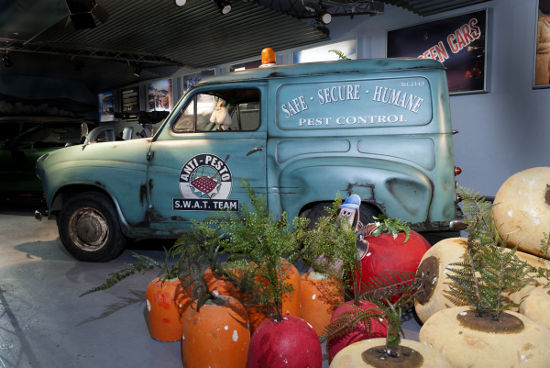

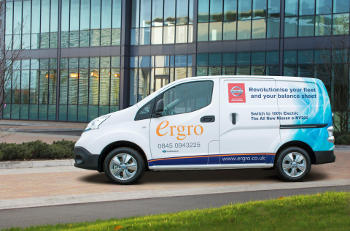 The latest installment in Nissan’s relentless and impressive campaign to promote its e-NV200 electric van is the ‘£2 Challenge’ — providing firms with the chance to see just how little an electric van costs to run on a daily basis.
The latest installment in Nissan’s relentless and impressive campaign to promote its e-NV200 electric van is the ‘£2 Challenge’ — providing firms with the chance to see just how little an electric van costs to run on a daily basis.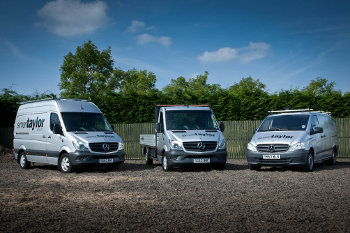 According to Simon Taylor, boss of the eponymous Ayrshire
According to Simon Taylor, boss of the eponymous Ayrshire 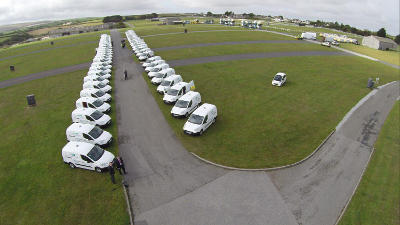
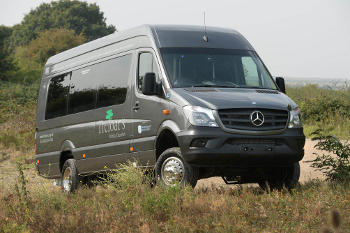 It’s not often that you see a 4×4 minibus, let alone a 4×4 minibus adapted to carry wheelchair-bound passengers.
It’s not often that you see a 4×4 minibus, let alone a 4×4 minibus adapted to carry wheelchair-bound passengers.
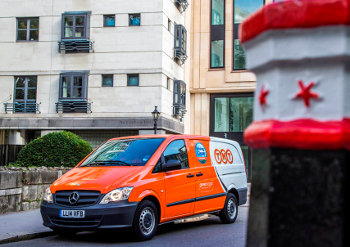 Within three months of commissioning its first all-electric Mercedes-Benz Vito E-CELL van, zero-emission final mile delivery specialist Gnewt Cargo had returned with an order for three more.
Within three months of commissioning its first all-electric Mercedes-Benz Vito E-CELL van, zero-emission final mile delivery specialist Gnewt Cargo had returned with an order for three more.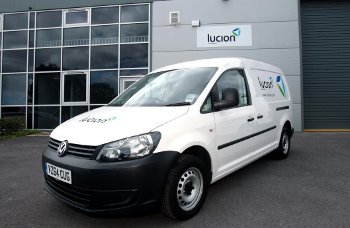
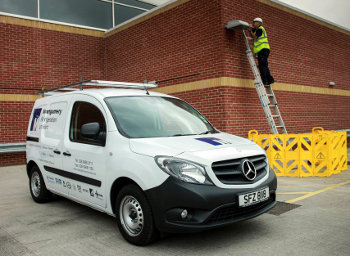 The arrival of the first Mercedes-Benz small van offering last year meant that Sprinter and Vito loyalists could — for the first time — satisfy their small van needs without being unfaithful to the three-pointed star.
The arrival of the first Mercedes-Benz small van offering last year meant that Sprinter and Vito loyalists could — for the first time — satisfy their small van needs without being unfaithful to the three-pointed star.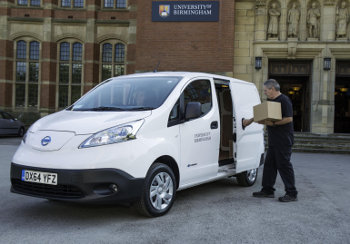 The University of Birmingham – one of the first fleet operators in the UK to place an order for the trailblazing Nissan e-NV200 all-electric van – has taken delivery of the vehicle.
The University of Birmingham – one of the first fleet operators in the UK to place an order for the trailblazing Nissan e-NV200 all-electric van – has taken delivery of the vehicle.